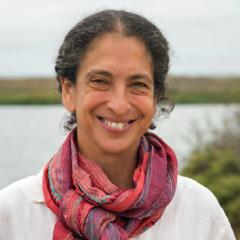Leadership capacities for a New Year in a changing world
Since the November 2016 election, I have been thinking a great deal about what it really means to engage in systems change for environmental work. The election of Donald Trump, even in the simplest analysis, represents so much more than a political ideological divide in our nation. It remains to be seen how our democracy can withstand the threats of cyber attacks; a cavalier attitude about ethics and accountability; climate change denial; and erosion of healthcare, education, pathways to citizenship and other system supports for citizens working to give themselves and their families a better life.
I still don’t have a clear answer for myself, but there are a few themes that emerged for me as I talk with colleagues and friends who are trying to make sense of where we are and how to move forward with clarity and action, but also with compassion.
One aspect that perhaps many of us are struggling with is knowing which level of change is most important for our efforts at this time. Is it time to support local and grassroots efforts? Engage at the state level to sustain past gains or fight old battles? Or do we amass our efforts for national level action? From a systems perspective it is hard for me to see one as more valuable than the other. More than ever, we need action at ALL levels.
Efforts to influence change at the “top” also need to be nourished and networked at the grassroots. Our organizations and leadership need to model the kind of transparent, inclusive and accountable structures we want to see at the highest levels of government. Each of us must find where we have the energy and passion to engage, and to preserve our democracy we MUST engage. The web of life, our communities and our earth systems demand this of us. Change at the top may be a longer-term effort and immediate action is always possible at the grassroots, but these levels must have pathways of connection and relevance between them.
A second theme that emerged for me is around science and truth. We are seeing the outcomes of a growing disdain for the objective methods and approaches of science, denial of well-proven facts (climate change, for instance), and the manufacture of news, narratives and storylines that can capture public sentiment more than objective reality. One of the challenges to science has been the absence of social science and social justice dimensions to the work we do, and at times even a denial that these forces are part of the picture. Some insights can be gained through the tenets of the Sociology of Science (which I won’t go into here) but there has never been a greater need for our scientific expertise to be coupled with sensitivity about how we articulate narratives about science and how this can dovetail with other forms of knowledge and knowing. The integration of Traditional Ecological Knowledge, participatory approaches to defining and undertaking scientific work, and the knowledge of resource user groups such as fishermen can build bridges and serve our environmental policy and community systems.
Finally, an aspect of science and policy action that was articulated by many Switzer Fellows in our recent annual survey (about which I will report next month) is that how we APPLY our scientific knowledge and expertise needs re-evaluation and perhaps new skills. Getting our message out to policy-makers and media is and has been a cornerstone of the Switzer Foundation’s investment in Fellows’ leadership development in recent years, with great success. The need for a deeper understanding of how we truly connect with those whose world views are different from ours, even if they’re on the same “side” in our discussions, needs a fresh look. Several new books attempt to illuminate the racial, cultural and economic divides across white America including Hillbilly Elegy (J.D. Vance), Waking up White (Debby Irving) and Between the World and Me (Ta-Nehisi Coates). These books and others aim to enlighten white America to our privilege and deep history of racial division in this country, while offering tools and insights for a positive way forward.
It may seem odd to link issues of race and science, but if we consider that science is a core policy tool, and our aim is to be effective communicators about the truth of our environmental goals, then we must also be more aware and attuned to our cultural histories as we interact with each other, and as we understand the biases that are implicit in how we define problems and seek answers.
A way forward is a deeper commitment to what we may already know – that data alone is not enough to change policy; to change policy we need to reach hearts and minds. Hearts and minds may be influenced by false narratives, but our human connections demand that we seek understanding and not blame. So, returning to my initial premise in this post, we need to remember that systems change happens at all levels. Perhaps our first step is to talk with our neighbors whose views differ from ours on some issues, but whose essential concerns, including health, well-being and quality of life, are the same as ours. Let’s keep talking with each other, to authentically find a way in to these conversations and learn from each others’ stories.
